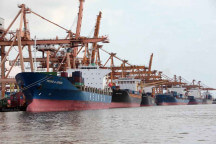KAMPALA: The Ugandan, Kenyan and Rwandan tax bodies are working out a deal that will link their tax systems with cargo being verified in Mombasa to boost tax collections, after international taxes missed targets.
Annual tax collections for the financial year 2012/13 recorded a 1.86% deficit with sh7.15trillion collected, some sh135.19b off targets.
Allen Kagina, the Uganda Revenue Authority (URA) commissioner general, revealed that the tax body will create a central processing area for all customs clearances to improve service delivery.
“Verification of taxes will be done in Mombasa while payments will be done in Uganda. Discussions are still on going,” she said.
“The business community will also be able to use one insurance bond for East Africa to cover all transactions.” The total value of imports into the country declined 1.41% to sh11.6trillion in the financial year 2012/13 from sh11.8trillion the year before resulting in lower than anticipated international trade taxes.
Fuel imports and a lower exchange rate missed targets by sh123b shortfall. Better than expected collections in value added tax, withholding tax on bank interest and import duty on dutiable goods overshot targets by sh268b.
Uganda’s annual tax collections have increased by 15% year-on-year with higher compliance by small and medium enterprises.
Gross Domestic Product grew at 5.1% below 5.4% target to undermine tax collections.More than 80% of Uganda’s sh13trillion national budget is to be funded through taxes this financial year.
Measures are being taken to increase the number of tax payers through partnerships between local authorities and the URA.
Henry Saaka, the commissioner domestic taxes, noted that the tax body will target whole, retail and construction businesses this year as collection targets hit sh8trillion from sh7trillion. The tax register has risen to 245,000 tax payers from 128,000.
Mobile services in districts of Kiboga, Kisoro, Kaberamaido, Moroto, Mubende, Luwero, Kalangala, Kamwenge and Kapchorwa are set to boost figures.
“The e-tax programme has been embraced much more than we had anticipated. We now have a much cleaner than tax register,” Saaka said.
Waiswa Abudu-Sallam, URA’s debt collection manager, noted that the tax body will attach property, publish shame lists and issue travel bans for tax payers that default on tax payments whenever voluntary compliance fails. The URA’s Dickson Kateshumba, noted that joint Ugandan, Kenyan and Rwandan single customs initiative will reduce delays at the port of Mombasa, reduce costs of business, and make the East African region more competitive.
Ugandan destined merchandises takes up 70% of the total cargo at the Kenyan port of Mombasa.
The URA is in discussions with the Kenyan Revenue Authority for a waiver for some 1,000 Uganda bond containers that have remained unclaimed for over two years at the port. Ambassador Richard Sezibera, the secretary general of East African community noted at a consultative meeting in Kampala that imports into the region will triple in the next five years. This will boost tax collections.





